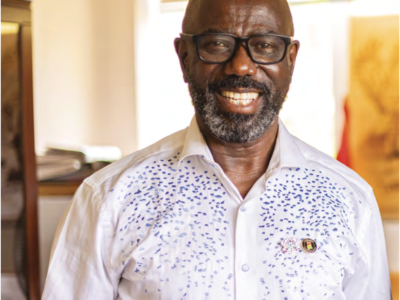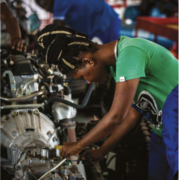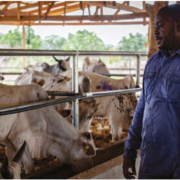We are faced with a global crisis and the lingering threat of Covid19. What can you say about the current position of Ghana on the export market? Well, we have to analyze Ghana’s position. Because of Covid19 businesses could not produce and meet the demands of their buyers in other countries. The lockdown affected all of us. GEPA was also hit hard. Normally, we get our funding from imports, but because imports were not coming in, we had to cut back as much as forty percent. Almost half of the year was gone. The funding of our programs, with regards to export facilitation and development, were reduced. This year we were supposed to increase our non-traditional exports and unfortunately, I don’t see that happening now.
What are the pillars of the National Export Development Strategy (NEDS) and how do these help to recover from the economic damage? I am glad you mentioned it. The strategy stands on three pillars. First of all, the improvement of our capacity to produce and export. Many times we go out and find buyers for our products, but then the ability to continuously produce and serve our buyers is not there. Maybe the capacity of the business is too small or there is no supply base. GEPA seeks to improve our businesses in that area.
The second pillar is about the improvement of our regulatory system. Many people want to export their products, but they get tired and frustrated with the regulations. We have to make it easier for people to get their goods sent across. For instance, how can GEPA help them to have their products certified, locally and internationally?
For the third pillar we want to build up our human resource capacity. Most of the time people think that export is just about selling your goods and services to another market. But it is not as easy as that. There are many things exporters have to learn concerning contracts and standards of the country where they want to do business. These countries have their own standard when it comes to food items, electrical and agricultural products. You need to understand them and we want to build that kind of capacity.
The NEDS is really our trump card. It is not only an important tool to recover from economic damage, but also essential in raising our national GDP. The government has brought in many policies to transform the country’s economy. We cannot just focus on the Ghanaian population of 30 million people. We have to create markets beyond that. Right now, we are moving away from exporting just raw materials. We want to industrialize the whole export environment and that means producing and exporting.
WE WANT TO INDUSTRALIZE The WHOLE OF GHANA’S EXPORT ENVIRONMENT.
In 2020 Ghana did not reach its Non-Traditional Exports (NTEs) threshold of 3 billion USD. How can GEPA curtail this? Yes, that is true. When we talk about NTEs, we have to differentiate them from the traditional exports, such as raw cocoa, raw gold, timber etc. In 2019, our absolute export value for Non Traditional Exports was around 2.9 billion USD. We were hoping to get around 3 billion USD as a bases for the next ten years. However, there has been a slight dip. We have done our export analyses. We know our strengths, challenges, opportunities and our threats. The NEDS is a strategy that contains all the interventions to improve our performance. When the various stakeholders come around the table to look at its implementation in detail, our NTEs will do much better.
Your strategy contains a 10-point agenda for this decade. Which of its main factors determines Ghana’s future as an export country? The ten point agenda is about the industrial transformation of this country. We look at things like the strategic anchor industries, the business environment regulatory reforms and the One District One Factory plan (having a factory in each of the 216 districts in Ghana). GEPA has woven its strategy around this agenda. For instance, if we are doing one factory in one district, how do we make sure that whatever product you are producing from that district factory will have potential for the export market? We will closely examine that factory and look at the packaging and the ingredients that go into the product.
Also, if we are talking about setting up a strategic anchor industry, say, Toyota comes here to set up a plant, we get close to them to understand what they are producing and if they are able to sell in other neighboring markets. Exporters such as Toyota or BMW will not solely be concentrated on the Ghanaian market. So, we should make it possible for them to access the whole region of West Africa as their market.
What role will GEPA have in the implementation of the African Continental Free Trade Agreement (AfCFTA) in Ghana? The AfCFTA is something the whole of Africa has been looking forward to. On the 1st of January 2021, we will start trading under this agreement. It means that businesses in Ghana and other African countries can sell their products everywhere in Africa. It means, you can take your peanuts to, for instance, Zambia and you will be able to sell it without any tariffs and other trade barriers. This agreement is especially important for the non-traditional products. Neighboring countries such as Burkina Faso, Togo, Benin and Nigeria have been our main trading partners. But now the whole of Africa functions as our market. Thus, also countries such as Zambia, Uganda, Egypt and Morocco are part of the trade area. We are talking about three trillion USD worth of business. GEPA has a leading role to play in making sure that our businessmen and women take full advantage of AfCFTA. One of the things we are doing is to go to each of the sixteen regions of Ghana and explain there what the agreement entails. What product would, for instance, Kenya need from us? How can all our businesses – small, medium and large – benefit from free trade? What will be our competitive advantages? This road trip is being undertaken with a team of representatives from various agencies that are part of the export ecosystem. So, GEPA is joined by the ACFTA secretariat, the Ministry of Trade, Ghana Standards Authority, Food & Drugs Authority, Customs etc. They all have a certain role to play.
Moreover, the headquarters of AfCFTA is right within the same building as GEPA – the Africa Trade House. Ghana championed this free trade deal from the beginning. Our former president tabled it a few years ago, playing a huge role in its making and today it is finally here. And with the AfCFTA secretariat nearby, we are determined to create a business and commercial hub right here in Accra.














Comments